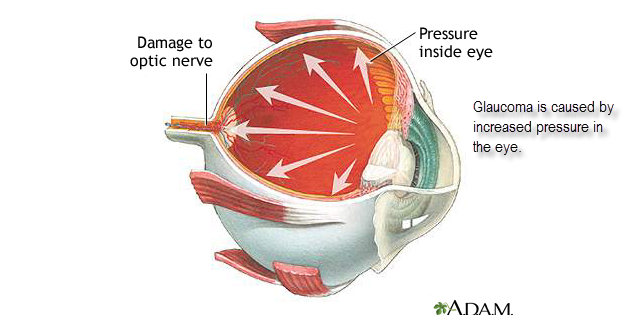It’s so true that you miss things when they’re gone but don’t let it happen to something as important as your eyesight. If you have read my bio, you know that I have glaucoma. But if you are like me, I had no idea what glaucoma really was or how it would affect my life until it happened to me. The eyes are very intricate organs that literally bring the world to us. Many of us take it for granted until it is threatened or gone.
I had an eye exam today for new glasses. I am fortunate not to have lost all of the vision in my right eye when I had an acute attack of narrow angle glaucoma. An acute attack comes on suddenly and without warning. In many cases, it brings intense migraine-like headaches. With an angle closure, the fluid in the eye gets trapped beneath the colored part of the eye (the iris) and causes an increase in intraocular pressure. Since the fluid can’t drain from the eye, it builds up and causes intense pain until it can be drained off. In my case, the eye was able to release the pressure intermittently so it wasn’t constant until the drainage opening scarred over. Once that happens, there is no relief until a medical intervention.
On five occasions I went to the emergency room with intense pain that I could only characterize as migraines because it was in my head. But I knew the pain was in my eye. What I didn’t know is that emergency room doctors are not trained to treat the eyes for this type of injury. It is very important if you cannot be your own advocate for your health that you have someone with you to advocate on your behalf. Without my husband, who understood what I had been going through, I don’t know if I would have been able to communicate effectively in that condition.
Doctors tried to help alleviate pain the best way they knew how. They looked for the potential problem by running tests and then treating the associated pain. Without knowing that what I was experiencing an acute glaucoma attack, I was subjected to MRIs, CT scans, and even a lumbar puncture. Without a defined cause of the problem, I was treated with mega doses of a narcotic pain reliever. Treating a symptom with a medication was only a bandage on a larger wound. It was only after my husband insisted on an ophthalmologist being called to evaluate my eyes that the root cause was identified.
No matter what the symptom, don’t dismiss eye problems. Take them seriously. I am truly grateful to have recovered some of my vision but it’s most important to pay attention to the symptoms and communicate them clearly before it’s too late and you’re not able to communicate them.
If you get sudden, intense pain in the eye, blurry vision, halos around the eyes, nausea and vomiting please see an ophthalmologist. Many times, glaucoma can come on slowly, robbing you of your sight over a long period of time. Be aware to any signs of diminished vision. Glaucoma often progresses undetected until the optic nerve already has been irreversibly damaged, with varying degrees of permanent vision loss.
Don’t get to the point where you will miss it when it’s gone. Save your sight by being proactive and having your eyes checked at least annually. If there is a history of glaucoma in your family, make certain your children are also screened. Prepare yourself before going to the eye doctor.
- Make a list of all of your symptoms
- List all the current medications you are taking and the condition for which your are taking them
- List any medical history about your eye health
- Write out any questions you may have including an explanation of the diagnosis, potential treatments, medications that may be prescribes and any concerns that you want to address
Most of all do not self-medicate. Using eye drops that someone else recommends or taking heavy duty pain relievers can cause more harm than good. Should your condition require surgery, seek out a qualified glaucoma specialist. You will most likely being seeing them for the rest of your life so make certain you find one that you are comfortable with their skills, abilities and bedside manner.
I believe that before I recognized the importance of a healthy diet I had allowed my blood glucose level to get too high and this may have triggered the onset of the acute glaucoma attack. It is absolutely necessary to have a healthy balanced nutritional plan in order for you to take care of your body, including your eyes. I would make the same recommendations to save your eyes as I do for the rest of your body – eat whole foods, get moving daily, avoid caffeine and drink plenty of filtered water. Also wear ear eye protection when you use power tools or play high-speed racket sports on enclosed courts. Also wear hats and sunglasses if you spend time outside.
Take care of your eyes so you can keep the whole world in your view.
Sources
http://www.ncbi.nlm.nih.gov/
http://emedicine.medscape.com/
http://www.allaboutvision.com/
http://www.mayoclinic.org/


Leave A Response